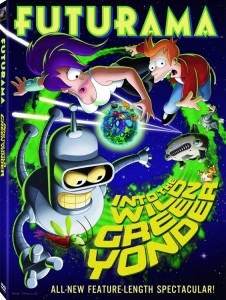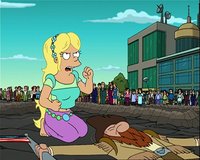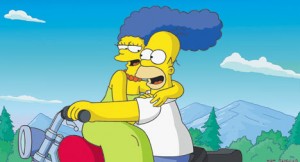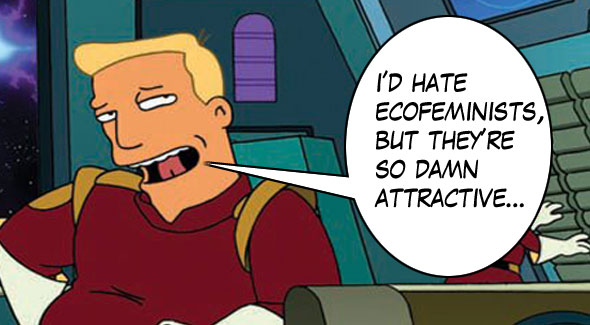 [Warning: Spoilers for the fourth Futurama movie.]
[Warning: Spoilers for the fourth Futurama movie.]
I was lucky enough to join Mr. Wrather at the sneak preview screening of Futurama: Into the Wild Green Yonder at this year’s NYC Comiccon. I found the plot somewhat hard to follow (although, possibly, that was part of the point), and the first third, which involves Bender dating the Robot Mafia Don’s girl, was completely irrelevant to the rest of the film. Each individual bit, however, was pretty funny–much funnier than the first two Futurama movies, in my opinion. Overall, though, I still found it inferior to any old Futurama episode running on Comedy Central.
But OTI isn’t a reviewing site; it’s an Overthinking site. And Overthink I shall. But I’ll do it below the fold so you can avoid tainting your brain with the spoilers I must reveal. If you’ve seen the movie or don’t mind being spoiled, read on, Macduff.
At the beginning of this fourth Futurama movie, a group of Ecofeminists are trying to stop Amy Wong’s father from destroying the environment to construct the Universe’s largest and most wasteful golf course. These Ecofeminists are the kind we’ve all seen before in TV-Land. They’re:
- annoying
- ineffectual
- and man-hating.
These are the Ecofeminists who replace “history” with “herstory” and “manuscript” with “womanuscript.” They love protecting every part of the environment, including vicious (wo)man-eating leeches that are so dangerous they can eat through cement walls. Rather than talk in normal voices, these Ecofeminists prefer screaming chants through bullhorns. Of course, no one wants to listen to them.
The moral of the story, in the first half of the film, then, seems to be, “MAN, are Ecofeminists annoying!” And, hey, maybe they are. Sure, the environmental activists and feminists I know are completely different from these buffoonish cartoon caricatures. But, then again, maybe I don’t know enough environmentalists or feminists. I’m only a young white middle-class female from New York, after all.
I’m not here to overthink how Futurama bashes Ecofeminists, though. I don’t particularly care if the writers like them or not. The interesting thing to me is that the first half of the film seems to be saying, “MAN, are Ecofeminists annoying,” while the second half of the film seems to be saying, “And I totally agree with them.”

Damn hippie Ecofeminists! Curse you for being so right!
Here’s what happens in the second half of the film (assuming I understood the complicated plot correctly):
- Leela, the most relatable, rational character in the show, joins the Ecofeminist group and eventually becomes their leader.
- A mystical prophecy says that Fry must help stop Leo Wong and “The Dark Ones” from destroying the environment (in this case, a particular star system) or Bad Things Will Happen. We know this is true because prophecies are always true in speculative fiction. ALWAYS TRUE.
- Leo Wong decides his environmentally-destructive Giant/Mini golf course will be for Men Only, even though his daughter, Amy, is a mini golf champion and Leo Wong sucks at mini golf.
- Leo Wong joins forces with Richard Nixon and Zapp Brannigan, Futurama’s resident male chauvinists.
- Every female member of the main cast and some female minor characters join Leela’s crusade after being treated badly by the men in their lives. This act is treated as The Right Thing to Do.
- Zapp Brannigan captures Ecofeminist collective and sends them to the Supreme Court, where they lose the case because the female justices get only 3/5ths of a vote.
- Leela and Fry save the star system, which is actually an astronomical sperm and egg, allowing the fertilization and birth of an alien being who brings every extinct species in the Universe back to life.
Okay. Let’s try to break this down. The first half of the movie seems to be hammering the point home that Ecofeminists are terrible, frustrating people who deserve to be mercilessly mocked. Then, the second half of the film says:
- All men (except Fry and maybe Kif) suck because they are awful to women.
- All men (except Fry) suck because they don’t care about the environment. They destroy it to make themselves feel more masculine.
- The government (represented here by the woman-hating President Nixon and Snoop Dogg’s Supreme Court) works constantly against women and the environment.
- And here’s the clincher: Men and women must reconcile with one another to save the environment. This moral is expressed by the fusion of the galactic sperm and egg plus the final “I love you’s” of Leela and Fry.
Maybe I’m crazy, but don’t these themes seem radically Ecofeminist?
If that’s the case and Into the Wild Green Yonder is espousing an Ecofeminist critique of modern America, then why all the Ecofeminist bashing in the first half of the film? I suggest that the first half of the movie was an insurance policy against those who would claim the end of the film was too lefty. “Too lefty?” the writers and producers could say. “But we mocked both sides equally!” And it’s true. The environmentalists in the movie, like the leech-loving Ecofeminists, come off as idiotic. The anti-environmentalists come off as greedy pigs. The feminists come off as overzealous and shrill. The men come off as penis-obsessed chauvinists. Equal opportunity satire, right? Everyone sucks in his or her own way.

Saving the environment with smooches and motorcycles.
In this respect, the fourth Futurama movie reminds me of The Simpsons Movie. In that movie, too, the writers first mock environmentalists (here, the EPA) as overzealous idiots before adopting a pro-environmental stance. The Simpsons Movie is fairly Ecofeminist, too. Springfield’s environment can only be saved once Homer realizes he has to be a loving husband to Marge. In both The Simpsons and Futurama films, environmental problems are linked to the male ego, while environmental solutions depend on male-female reconciliation.
However, while The Simpsons movie and Into the Wild Green Yonder deal with the same issues and came down on the same radical Ecofeminist stance, I think The Simpsons pulls it off better. That’s because Homer actually has to change throughout the movie and understand that he was wrong. He learns that the only way to save the environment and his marriage is to realize the world doesn’t revolve around his own desires.
In Futurama, though, none of the characters really learn anything. At the end of the film, the Ecofeminists are still annoying–in fact, their previous leader, Frida Waterfall is unceremoniously killed, thrown in a telephone booth, and stepped on to drive the point home. Their mascot, the vicious man-eating leech, turns out to be the last Dark One, so extinction is the only answer for that species. (In other words, “Save the Whales… Unless They Turn Out to Be Evil.”) Fry saves the environment not because of any realistic reason but because a prophecy told him he has to. Leela and Fry, Amy and Kif, and Hermes and LaBarbara reconcile not because any of them learned anything about the opposite sex, but because the movie is ending and everything needs to be tied up quickly. Zapp Brannigan, we expect, will continue to be a chauvinist; Leo Wong will continue raping the environment. How can an audience learn anything from a movie if its characters don’t even manage to learn?
Eh, I’m going to go watch Wall-E. It’s not as funny as Futurama, but at least it knows where it stands.

Futurama has always taken a stand to promote environmental ideals through consumerist ways. In A Big Piece of Garbage, a giant landfill threatens New New York and only an equally large landfill can save the day. The moral is that no matter how much we screw up, it will be someone else’s problem in the future. How about Crimes of the Hot and how it tackles global warming? A problem arises when it is discovered that robots are the leading cause of global warming. The government solution was to destroy all of the robots, but it is the robots, through extended pollution outputs, save themselves and the planet in the process. Both of these episodes offer modern problems with hyperbolic solutions in facetious manners. If you want to uncover the underlining philosophy of Futurama, all you need to view is The Problem with Popplers where we learn that it is o.k. to eat animals as long as they are stupid. This is the manifesto of the geek counter-culture, it is o.k. to defeat your opponent if you are indeed better than them, and who is better than all of us then the creators of Futurama?
I dunno. I just watched A Big Piece of Garbage last week, and I thought the end where they pollute to fix the pollution problem was clearly facetious. Fry says something along the lines of, “See? Now you’re thinking like 20th century humans.” I’m not sure that means the writers are actually espousing that point of view, because it clearly comes off as satire.
In the fourth movie, however, ecofeminism is first presented as funny and then presented as serious. There’s no indication to me that the ending of the film (where they kill the leech and allow the Encyclopod or whatever it’s called to come to life) is satirical.
Anyway, I’m not sure, but it definitely seems like the writing staff of the movies and the writing staff of the TV show are somewhat different. I’ll have to check on that, though.
I agree that the writing is different between the TV show and the movies. The movies are a long episode that changes to a different long episode halfway through that doesn’t really fit into the former episdoe. I noticed the same thing happen with Family Guy after the cancelation and then the re-launch. I guess writers notice when their project fails for a network but is loved by an audience so they decide to write for their audience instead of the network. Unfortunately, that means that they throw out the conventinal process of writing and instead create a paradox where nothing is means what it is supposed to mean. However, having not seen the movie yet, I cannot justify my comments here, but I do appriciate mlawski, the author of this enjoyable article, responding to my first “meat-bag” post. Whimmy wham wham wazoo!
Mlawski, thanks for the review and the overthoughts on Futurama. I have one issue with your line of argumentation, though: You’re problem with the plot is, as I understand you, that the film first bashes ecofeminism, then worships it. But from what you describe, the end is not really worshiping ecofeminism: Reconciliation between man and woman, in my view, is not really an ecofeminist idea. After all, they’re ecofeminists, so they’re out there to fight against men. I see that ending rather as an attempt by the writers to show that only a “great big compromise” is what will save us all.
But I agree that the Futurama movies’ plot lines are more than a little whacky. I liked the first one and the third one. But for instance, I would never show a person who knows nothing about Futurama one of the movies, I’d definitely pick some good episodes in order to expose someone to this show and try to get across why I like it.
Also, a question out of curiosity: Why do you capitalize the word ecofeminism like it is some sort of proper name?
@Johann: Interesting points. I’d argue, however, that most feminists are for reconciliation between the genders. Most feminists I know want equality, not chauvinism with the genders switched around. Here, check out the Feminism 101 blog: http://finallyfeminism101.wordpress.com/2007/03/10/faq-why-do-you-feminists-hate-men/
I capitalized ecofeminism so it’d be easier to read. Hope it didn’t bother you too much :)
And, yeah, I wasn’t big on the Futurama movies, although I haven’t seen the third one. It’s probably the one I’d like the best, based on what I know about it.
@mlawski
I guess I wasn’t very clear in my post: I do know that most feminists don’t hate men and don’t want to establish a female dictatorship. I just sort of argumented from within the mind of the Futurama writers, who apparently have difficulties with diversity within social movements.
Also: I can handle your capitalization, no problem. :)